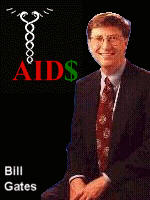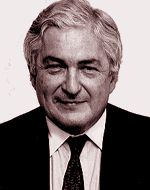 |

 |
|
Compiled By GayToday
 New York, May 3 -- The International AIDS Vaccine Initiative
(IAVI) announced Monday that it had received a U.S. $25 million grant, the
largest charitable gift in the history of the AIDS pandemic, from the
William H. Gates Foundation.
New York, May 3 -- The International AIDS Vaccine Initiative
(IAVI) announced Monday that it had received a U.S. $25 million grant, the
largest charitable gift in the history of the AIDS pandemic, from the
William H. Gates Foundation.
IAVI promises to more than double its AIDS vaccine development efforts as a result. "Bill and Melinda Gates' historic act of generosity will allow us to significantly accelerate the scientific effort," Seth Berkley, M.D., IAVI's president, said. "With 16,000 new HIV infections a day, 95% of them in developing countries where there is little access to treatment, we have no time to spare."
The Scientific Blueprint lays out a detailed scientific strategy to develop an AIDS vaccine as quickly as possible. Gates' Goal: "A World Without AIDS" "Melinda and I want our children - and all children - to grow up in a world without AIDS," said Bill Gates, the founder of the William H. Gates Foundation and the founder and chairman of Microsoft Corp. " Promoters of the search for an effective vaccine argue that they are 'one of the most far-reaching and effective technologies of our time.' Though nearly fifty million already been infected may not benefit from such a preventive, those who favor vaccines over cures as AIDS weaponry insist that a 'widely distributed vaccine can help make the goal of a world without AIDS a reality.' Gates continued: " Shortening the time it will take to find a vaccine can save millions of lives. We're proud to be supporting the heroic work of IAVI in this gift, " he added. The William H. Gates Foundation made an initial $1.5 million commitment to IAVI at the World AIDS Conference in Geneva last June. "We applaud IAVI's commitment to ending AIDS for all time," said William H. Gates, Sr., who oversees Foundation activities for his son. "We're persuaded that the strategy of moving multiple vaccine candidates forward simultaneously will yield the fastest results." Gates, Sr. particularly praised IAVI's goal of making AIDS vaccines accessible in developing countries. "This is very much in keeping with the philosophy of the Bill and Melinda Gates Children's Vaccine Program, which seeks to immunize children in developing countries against vaccine-preventable diseases," he said. "It would be a hollow victory to save millions of children's lives, only to have them reach maturity and succumb to AIDS." World Bank and UNAIDS Applaud Grants
"The World Bank has provided seed grants of several million dollars to assist IAVI's start-up, so we are especially pleased to see this strong private contribution by the Gates Foundation further build up IAVI's capacity." Peter Piot, Ph.D., the director UNAIDS, applauded the Gates and Sloan grants. He emphasized, however, that current prevention technologies remain the key to controlling the epidemic until an effective vaccine is developed and widely distributed. "In the short term, we must do what we know works; in the long-term, a vaccine is the best answer to this pandemic," Piot said. In 1998, IAVI was named a collaborating centre of UNAIDS. Sloan's Gomory: IAVI Can Make A Critical Difference Ralph E. Gomory, president of the Sloan Foundation, called on governments, multilateral organizations, foundations, and individuals to join in funding IAVI's work. "There is a pressing need for a practical and focused effort like IAVI's," he said. "Support for IAVI can make a critical difference to a massive worldwide problem that everybody recognizes but few know how to attack in a practical way." IAVI is moving quickly to deploy its new resources. "We are convening a scientific think tank in Europe next month to identify promising vaccine approaches," said Jaap Goudsmit, M.D., Ph.D., chair of IAVI's Scientific Advisory Committee and chair of the Department of Human Retrovirology at the University of Amsterdam. IAVI held a similar brainstorming session in New York last month. Using "Social Venture Capital" to Ensure Access IAVI's Vaccine Development Partnerships link scientists in industrialized and developing countries with private industry to develop and test vaccine candidates as quickly as possible. It is IAVI's belief that developing country scientists must be full partners in any AIDS vaccine development efforts for their countries. IAVI launched its first two partnerships -- linking the U.K and Kenya, and the U.S. and South Africa -- by investing $9.1 million in them in November, 1998. In creating its Vaccine Development Partnerships, IAVI has acted as a "social venture capitalist," using its financing to secure intellectual property agreements to ensure that the IAVI-funded vaccines are available in developing countries at a reasonable price. "This is a new paradigm for vaccine development," Berkley said. "Priority vaccines should be available simultaneously in the North and the South. "Developing countries should not be forced to wait 10 or 15 years for an AIDS vaccine to trickle down to them." "In the face of 16,000 new infections a day, the vast majority of them poor people in developing countries, this is a human crisis and a development crisis that the global community must overcome -- with better prevention, with treatments that are within the reach of poor countries' health systems, and ultimately with an effective vaccine," the World Bank's Wolfensohn added. "I am personally committed to expanding the World Bank's already substantial AIDS program, working alongside our partners WHO and all the members of the UNAIDS alliance -- and that includes exploring what we can do to encourage an AIDS vaccine," Wolfensohn continued. "IAVI's energy and its support for vaccine work in developing as well as industrial countries make it a valued member of this broad partnership." |


